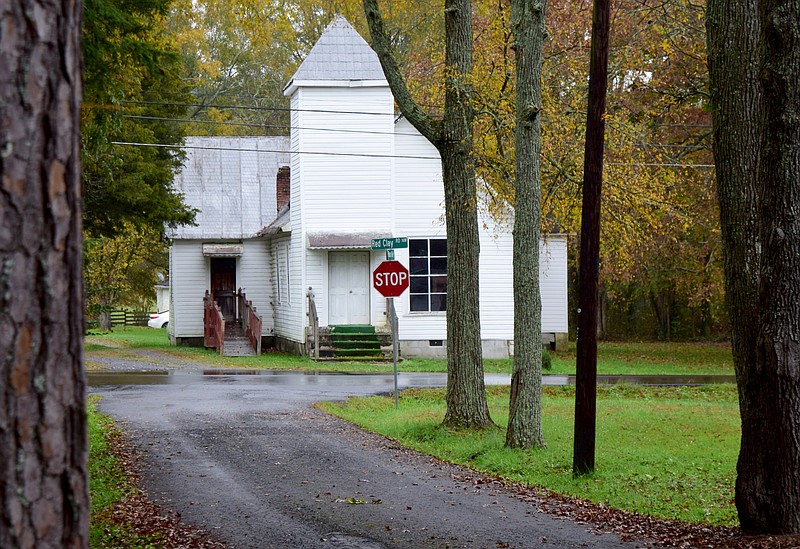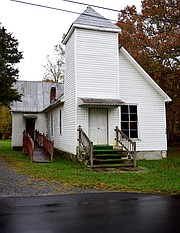In the African American Civic District in Cohutta, Georgia, fewer than a handful of buildings, one dating back more than a century, are fighting a battle with time.
Cohutta Mayor Ron Shinnick said the Whitfield County site's recent inclusion on the Georgia Trust for Historic Preservation's 2021 list of "10 Places in Peril" might seem odd to celebrate, but small towns have few resources for historic preservation. He said the trust's recognition of the site's importance is a good way to get the word out that the aging buildings need help before it's too late.
"We're really excited that they would include us on that list," Shinnick said. "It really is kind of special, in a different way, to be included on that list but it opens up some funding sources and, of course, as a small town we don't have a lot of extra money for restoration projects."
According to the trust, the civic district in Cohutta represents the history of "a small but vibrant enclave of Black Georgians" in three contiguous properties that now belong to the town: Andrews Chapel, Pleasant Valley Baptist Church and the Old Colored School.
The properties are located on either side of Red Clay Road at the intersection with Pleasant Valley Drive near Norfolk Southern Railway's line linking nearby Dalton in Georgia with Cleveland and Chattanooga in Tennessee. Railroads played a major role in Cohutta's birth, officials said. The northern city limit of Cohutta, a town of between 600 and 700 people, is less than a half-mile from the state line.
Andrews Chapel, with a congregation organized in the 1870s, was constructed in 1902 and moved to its current location in 1923, according to the preservation trust.
Pleasant Valley Baptist Church, built in 1941, reflected continued growth of the Black community, trust officials said.
The Old Colored School was constructed in 1930 and remained open until 1953 when it merged with another school during the civil rights era, trust officials said. The school building also served as a fellowship hall for the church congregations.
(READ MORE: Lincoln School on minds of alumni in Pikeville, Tenn.)
"The Andrews Chapel and the one-room schoolhouse and the other church are really the center of what was once a thriving African American community here," Shinnick said. He said the original building was constructed by African Americans in an agricultural community, parts of which would become Red Clay State Park in Tennessee.
The congregation moved that building several miles south to the site where it stands today using "mules and rolling logs," Shinnick said, noting that a hand-carved cornerstone bearing the names of the original founders of the church is still in place.
The church was named for former slave Henry Andrews, who lived on a plantation in the area now known as Apison, according to information on the Historic Rural Church of Georgia website. Andrews, after the Civil War ended and the congregation was formed, walked the seven miles from Apison to Red Clay to lead the church as its minister. Its founders were the Rev. J.S. Williams, W.M. Prater, J.A. Prater, B.H. Prater, T.E. Prater, W.L. Cregmiles and E.D. Barett, according to the website.
The chapel is included among 13 sites in Cohutta identified as those of historical and cultural interest in the town's 2015 20-year comprehensive plan.
The sites marking the Black community's presence are an important part of Cohutta's history, and the town has an important role in Whitfield County's history, Shinnick said.
"It's a small community, but in the last 100-plus years Cohutta has really been a really important part of the north end of Whitfield County and Southern Bradley County (Tennessee) with commerce and businesses," he said.
Cohutta can trace its roots back to the development and expansion of the railroad, according to the town's website. The small town of Red Clay, located just north of Cohutta and the Georgia-Tennessee state line, was the hub of a "thriving and prosperous agricultural community during those early days," according to the town's history. With late-19th century growth in Chattanooga and Dalton, railroad developers saw a need for a direct route between the two cities passing through a small community that would become Cohutta. Historical accounts say the area went by a variety of names such as "Woodyard" and "Shake Rag," eventually landing officially on the name Cohutta for the place where the rail lines connected.
(READ MORE: Historic Black churches among Georgia's 'places in peril')
The tiny town became home in subsequent years to a post office, hotel, blacksmith shop, automobile repair shop, schools, cotton gins and later electricity, street lights and public water were added, documents show. Cohutta was officially chartered in 1969.
As time passed, the lack of maintenance on the historical properties started to show, and it's time to preserve them before it's too late, Shinnick said.
(READ MORE: Dade County's oldest dwelling target of restoration)
"People are moving back here now and the community is growing and we've had some businesses come back to town," he said of changes in recent years. "But the African American community here, a lot of them have moved off, some have passed away, and the church was kind of getting in a state of ruin and we didn't want to see that happen."
After Cohutta officials started seeking state resources, the Georgia trust took a look at the buildings and placed it on the annual list, he said.
All three of the historically significant resources are now owned by the town of Cohutta, but long-established threats persist, according to the trust.
"Population has dwindled and use of the buildings has become sporadic. Stabilization and routine maintenance are concerns for each of the buildings," trust officials said. The threat to the Old Colored School and the Pleasant Valley Church is water and moisture, and both buildings suffer from water infiltration and deterioration, officials said.
In a news release, trust president and CEO Mark C. McDonald said he hoped the list, now in its 16th year, "will continue to bring preservation solutions to Georgia's imperiled historic resources."
"In the coming year, the trust will work closely with representatives associated with each site to develop unique approaches for each site's preservation. But we cannot do it alone," McDonald said in a livestreamed announcement earlier this month.
He said the effort needs support from the public.
"We're excited to partner with [the trust] and it's going to be an important venture for all of us," Shinnick said.
Contact Ben Benton at bbenton@timesfreepress.com or 423-757-6569. Follow him on Twitter @BenBenton or at www.facebook.com/benbenton1.
GEORGIA'S OTHER 2021 'PLACES IN PERIL'
* Ashby Street Theatre in Atlanta, Fulton County * Atlanta Eagle and Kodak Buildings in Atlanta, Fulton County * Blackshear City Jail in Blackshear, Pierce County * Cherry Grove Schoolhouse in Washington, Wilkes County * Downtown Toomsboro, Wilkinson County * Kiah House Museum in Savannah, Chatham County * Old Monticello United Methodist Church in Monticello, Jasper County * Terrell County Courthouse in Dawson, Terrell County * Vineville Avenue Corridor in Macon, Bibb County Source: The Georgia Trust for Historic Preservation

